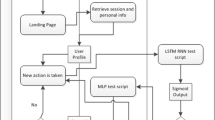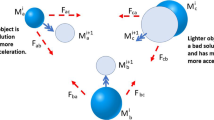Abstract
Customer Relationship Management (CRM) has gained more attention due to customer satisfaction based on management decisions. However, customer review maintenance is challenging in the management field because of the structured and unstructured data. This paper proposes a novel Generalized Savitzky-Golay Filter (GS-GF) and Hybrid Self Constructing Neural Fuzzy based African Buffalo Optimization (HSCFN-ABO) techniques for maintaining customer reviews; the customer’s reaction may be positive, negative, or neutral. This novel technique provides a solution for classifying customer comments based on the specified problem, including food quality, food delivery, and payment issues. Initially, pre-processing and feature extraction is performed using the novel GS-GF approach. Once the features are extracted from the dataset, they enter the classification layer to value customer reviews using the novel HSCFN-ABO replica. The execution of this research is done using the MATLAB R2018b platform. The proposed HSCFN-ABO classifier method in CRM is tested using the real dataset from swiggy. CRM performance for customer review data using the proposed technique is validated with different case studies. Furthermore, the projected HSCFN-ABO method is compared with various other traditional methods in terms of accuracy, precision, and F measure, proving the significance of the HSCFN-ABO classifier in CRM applications.











Similar content being viewed by others
References
Akerkar R (2019) Introduction to artificial intelligence. Artificial Intelligence for Business. Springer, Cham, pp 1–18
Al-Fedaghi S, Al-Otaibi M (2019) Service-Oriented Systems as A Thining Machine: A Case Study of Customer Relationship Management. 2019 IEEE 2nd international conference on information and computer technologies (ICICT). Kahului, HI, USA, pp. 235–242. https://doi.org/10.1109/INFOCT.2019.8710891
Al-Qudah DA, Al-Zoubi AM, Castillo-Valdivieso PA, Faris H (2020) Sentiment analysis for e-payment service providers using evolutionary eXtreme gradient boosting. IEEE Access 8:189930–189944. https://doi.org/10.1109/ACCESS.2020.3032216
Asif M, Ishtiaq A, Ahmad H, Aljuaid H, Shah J (2020) Sentiment analysis of extremism in social media from textual information. Telematics Inform 48:101345. https://doi.org/10.1016/j.tele.2020.101345
Basak S, Kar S, Saha S, Khaidem L, Dey SR (2019) Predicting the direction of stock market prices using tree-based classifiers. North Am J Econ Finance 47:552–567. https://doi.org/10.1016/j.najef.2018.06.013
Capuano N, Greco L, Ritrovato P, Vento M (2020) Sentiment analysis for customer relationship management: an incremental learning approach. Appl Intell 51:3339–3352. https://doi.org/10.1007/s10489-020-01984-x
Choi SB, Kim JM (2019) Multimedia mobile application e-commerce service satisfaction. Multimed Tools Appl 78:5217–5231. https://doi.org/10.1007/s11042-017-4865-9
Dalvi PK, Khandge SK, Deomore A et al (2016) Analysis of customer churn prediction in telecom industry using decision trees and logistic regression. 2016 symposium on colossal data analysis and networking (CDAN), Indore, pp 1-4. https://doi.org/10.1109/CDAN.2016.7570883
De Caigny A, Coussement K, De Bock KW (2018) A new hybrid classification algorithm for customer churn prediction based on logistic regression and decision trees. Eur J Oper Res 269(2):760–772. https://doi.org/10.1016/j.ejor.2018.02.009
De Caigny A, Coussement K, De Bock KW, Lessmann S (2020) Incorporating textual information in customer churn prediction models based on a convolutional neural network. Int J Forecast 36(4):1563–1578. https://doi.org/10.1016/j.ijforecast.2019.03.029
Dewnarain S, Ramkissoon H, Mavondo F (2019) Social customer relationship management: an integrated conceptual framework. J Hosp Mark Manag 28(2):172–188. https://doi.org/10.1080/19368623.2018.1516588
Dursun A, Caber M (2016) Using data mining techniques for profiling profitable hotel customers: an application of RFM analysis. Tour Manag Perspect 18:153–160. https://doi.org/10.1016/j.tmp.2016.03.001
Fares A, Gama J, Campos P (2019) Process Mining for Analyzing Customer Relationship Management Systems: a case study. In: Sayed-Mouchaweh M (ed) Learning from data streams in evolving environments, studies in big data, vol 41. Springer, Cham. https://doi.org/10.1007/978-3-319-89803-2_9
Ghosh R, Saha TR (2018) A study of e-payment system on food delivery industry: a case study on swiggy. Int J Recent Trends Bus Tour (IJRTBT) 2(3):19–25
Gokulkumari G (2020) Analytical outlook on customer awareness towards biometrics mechanism of unimodal and multimodal in online transactions. Multimed Tools Appl 79:31691–31714. https://doi.org/10.1007/s11042-020-09526-w
Guha S, Harrigan P, Soutar G (2018) Linking social media to customer relationship management (CRM): a qualitative study on SMEs. J Small Bus Entrep 30(3):193–214
Gupta H, Singh S, Sinha P (2017) Multimedia tool as a predictor for social media advertising- a YouTube way. Multimed Tools Appl 76:18557–18568. https://doi.org/10.1007/s11042-016-4249-6
Ibrahim A, Turrahma A, Ruskan EL (2019) The implementation of customer relationship management (CRM) with service oriented architecture (SOA) to improve Customer’s loyalty. J Phys Conf Ser 1196(1) IOP publishing:012026
Kasemsap K (2019) Facilitating customer relationship Management in Modern Business. Advanced Methodologies and Technologies in Digital Marketing and Entrepreneurship, IGI Global, vol 13, pp. 44–56. https://doi.org/10.4018/978-1-5225-7766-9.ch004
Kumar Deb S, Jain R, Deb V (2018) Artificial intelligence―creating automated insights for customer relationship management. 2018 8th international conference on cloud computing, Data Science & Engineering (confluence), Noida, pp 758-764. https://doi.org/10.1109/CONFLUENCE.2018.8442900
Kumar V, Werner R (2018) Data mining. Customer relationship management. Springer, Berlin, pp 135–155
Kumar RS, Saviour Devaraj AF, Rajeswari M, Julie EG, Robinson YH, Shanmuganathan V (2021) Exploration of sentiment analysis and legitimate artistry for opinion mining. Multimed Tools Appl. https://doi.org/10.1007/s11042-020-10480-w
Navimipour NJ, Soltani Z (2016) The impact of cost, technology acceptance and employee's satisfaction on the effectiveness of the electronic customer relationship management systems. Comput Hum Behav, Part B 55:1052–1066. https://doi.org/10.1016/j.chb.2015.10.036
Odili JB, Mohmad Kahar MN (2016) Solving the traveling Salesman's problem using the African Buffalo optimization. Comput Intel Neurosc 2016(1510256):1–12. https://doi.org/10.1155/2016/1510256
Qaisi LM, Rodan A, Qaddoum K, Al-Sayyed R (2018) Customer churn prediction using data mining approach. 2018 Fifth HCT information technology trends (ITT), Dubai, United Arab Emirates, pp. 348–352. https://doi.org/10.1109/CTIT.2018.8649494
Saad SE, Yang J (2019) Twitter sentiment analysis based on ordinal regression. IEEE Access 7:163677–163685. https://doi.org/10.1109/ACCESS.2019.2952127
Sánchez-Franco MJ, Navarro-García A, Rondán-Cataluña FJ (2019) A naive Bayes strategy for classifying customer satisfaction: a study based on online reviews of hospitality services. J Bus Res 101:499–506. https://doi.org/10.1016/j.jbusres.2018.12.051
Santouridis I, Veraki A (2017) Customer relationship management and customer satisfaction: the mediating role of relationship quality. Total Qual Manag Bus 28(9–10):1122–1133. https://doi.org/10.1080/14783363.2017.1303889
Singh P, Agrawal V (2019) A collaborative model for customer retention on user service experience. In: Bhatia S, Tiwari S, Mishra K, Trivedi M (eds) Advances in computer communication and computational sciences, Adv Intell Syst, vol 924. Springer, Singapore. https://doi.org/10.1007/978-981-13-6861-5_5
Sung CS, Park JY (2021) Design of an intelligent video surveillance system for crime prevention: applying deep learning technology. Multimed Tools Appl 80:34297–34309. https://doi.org/10.1007/s11042-021-10809-z
Vafeiadis T, Diamantaras KI, Sarigiannidis G, Chatzisavvas KC (2015) A comparison of machine learning techniques for customer churn prediction. Simul Model Pract Th 55:1–9. https://doi.org/10.1016/j.simpat.2015.03.003
Yu JB, Yu Y, Wang LN, Yuan Z, Ji X (2016) The knowledge modeling system of ready-mixed concrete enterprise and artificial intelligence with ANN-GA for manufacturing production. J Intell Manuf 27:905–914. https://doi.org/10.1007/s10845-014-0923-6
Zare A, Motadel MR, Jalali A (2020) Presenting a hybrid model in social networks recommendation system architecture development. AI & Soc 35:469–483. https://doi.org/10.1007/s00146-019-00893-z
Zerbino P, Aloini D, Dulmin R, Mininno V (2018) Big data-enabled customer relationship management: a holistic approach. Inf Process Manag 54(5):818–846. https://doi.org/10.1016/j.ipm.2017.10.005
Zhang X, Zhang Z, Liang D, Jin H (2018) A novel decision tree based on profit variance maximization criterion for customer churn problem, 2018 10th international conference on intelligent human-machine systems and cybernetics (IHMSC), Hangzhou, pp 20-23. https://doi.org/10.1109/IHMSC.2018.00013
Acknowledgments
None
Author information
Authors and Affiliations
Corresponding author
Ethics declarations
Ethics approval
All applicable institutional and/or national guidelines for the care and use of animals were followed.
Informed consent
For this type of study formal consent is not required.
Conflict of interest
The authors declare that they have no potential conflict of interest.
Additional information
Publisher’s note
Springer Nature remains neutral with regard to jurisdictional claims in published maps and institutional affiliations.
Rights and permissions
About this article
Cite this article
Jha, R. A novel hybrid intelligent technique to enhance customer relationship management in online food delivery system. Multimed Tools Appl 81, 28583–28606 (2022). https://doi.org/10.1007/s11042-022-12877-1
Received:
Revised:
Accepted:
Published:
Issue Date:
DOI: https://doi.org/10.1007/s11042-022-12877-1




